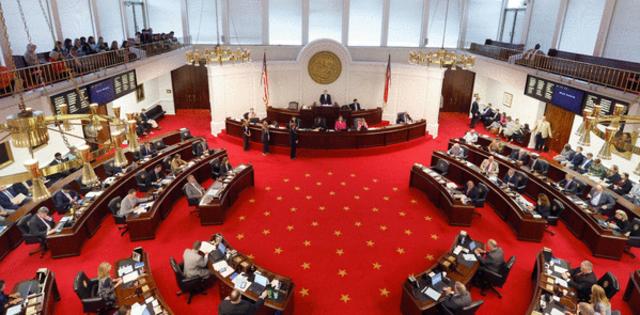NC Senate budget would set future tax cuts, raise state worker and teacher pay
Published in News & Features
North Carolina Senate Republicans said they would raise teacher pay by a few percentage points over two years, with smaller raises for most state employees, and replenish the Rainy Day Fund in their budget bill set to be published Monday evening.
Republican leaders spoke to reporters about the budget Monday evening ahead of the legislation being made public, and about 10 minutes after announcing highlights via an emailed news release.
Senate leader Phil Berger told reporters that the budget will take on “obsolete programs” and “bloated bureaucracy.”
Senate Republicans want to spend about $32.6 billion in the first year, and about $33.3 billion the second year. Republicans also said that they would raise the state’s Rainy Day Fund to $4.75 billion, the amount where it stood before Helene hit Western North Carolina.
The budget would give most state employees a 1.25% raise and a $3,000 bonus over two years, they said, with law enforcement and corrections officers set to receive higher raises. Teachers would get 2.3% the first year on average, and 3.3% average over the two years, along with a $3,000 bonus, they added.
The budget would also put $638.5 million toward a new UNC and Duke University children’s hospital.
The budget also would add $3.5 billion over two years to the State Capital Infrastructure Fund, which pays for construction projects at universities, Sen. Brent Jackson, a top budget writer, said.
Also, the Senate proposal adds another $700 million to the Helene reserve fund, Sen. Ralph Hise said. Hise is a Republican from Spruce Pine, in the area hit by Helene.
“We must prepare to fend for ourselves,” Hise said, even though they “remain hopeful that the federal government will provide increased and expedited reimbursements” for Helene recovery.
Under previous budgets, the individual income tax rate dropped to 4.5% for the 2024 tax year, then dropped in 2025 down to 4.25%. The rate was set to drop after that to 3.99%. The Senate budget would cut the rate to 3.49% in 2027 and 2.99% in 2028.
The Senate and House take turns over which chamber goes first. Once the Senate takes final votes on its budget, about a month later, the House will pass its own budget bill. Then the two chambers will negotiate a final budget bill to send to Democratic Gov. Josh Stein. Stein will have 10 days to sign, veto or let it become law without his signature.
Gov. Stein’s budget proposal
Stein has already warned that it should be a tight spending year.
Stein’s budget proposal includes raises of 2% for most state employees, an average 10.6% raise for teachers, a moratorium on private school vouchers and a freeze on the cuts to the individual and corporate income tax rates. Stein’s proposal would spend $33.6 billion in the first year of the two-year plan and $34.3 billion in the second.
Stein wants to raise starting teachers’ base pay to $44,500 a year starting in July, and to $51,200 for the following fiscal year, 2026-27. The current base pay set by the state for a starting teacher is $41,000. The state provides supplements to rural school districts, and metro counties have their own supplements. Including supplements, starting teacher pay for 2025 in North Carolina is $42,804, and Stein’s proposal would raise that to $53,000 in 2027.
Berger told reporters last week that the budget bill would include policy from a bill the Senate passed expanding the office of Republican State Auditor Dave Boliek. Republicans said Monday evening that the budget appropriates $6 million to Boliek’s office to establish a Division of Accountability, Value and Efficiency.
Budget negotiations between the governor and General Assembly have dragged out for months in recent years, under Stein’s predecessor, former Democratic Gov. Roy Cooper. Some delays also happen because even though the Senate and House are both controlled by Republicans, they often have a hard time finding agreement on a final budget bill. For example, the two chambers fought over legalizing more casinos; that effort stalled during the last budget battle. For Cooper and Republicans, it was over Medicaid expansion, tax cuts and teacher pay.
_____
©2025 Raleigh News & Observer. Visit newsobserver.com. Distributed by Tribune Content Agency, LLC.







Comments